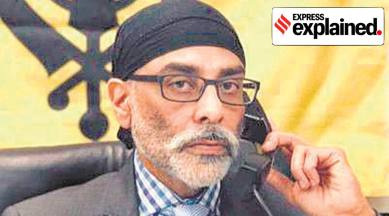SFJ defaces walls of Delhi Metro stations ahead of G20 Summit: What is this pro-Khalistan outfit
What is Sikhs For Justice, banned by the Centre in 2019? Who is its founder, Gurpatwant Singh Pannun?

The walls of Metro stations in the National Capital were defaced with pro-Khalistan slogans days ahead of the G20 Summit. The Delhi Police said the banned outfit Sikhs For Justice (SFJ) was suspected to be responsible, and have registered a case.
The walls at Udyog Nagar, Paschim Vihar, Nangloi and Shivaji Park stations were spray-painted with several slogans including, ‘Khalistan Zindabad’, the police said.
monthly limit of free stories.
with an Express account.
SFJ purportedly released a video of the incident, in which its chief Gurpatwant Singh Pannun is seen talking about the graffiti. “The battle of G20 Pragati Maidan has started today… (Prime Minister) Modi and India are targets,” he purportedly says in the clip. The organisation said their members went to four to five Metro stations and sent a message to G20 nations with the graffiti.
What is Sikhs for Justice, and who is Pannun?
The Indian Express had explained this in October 2022, when Interpol had rejected a request by India to issue a Red Notice against Pannun, saying Indian authorities had not provided sufficient information on him. Here are sections from that piece.
Originally from Khankot village on the outskirts of Amritsar, Pannun graduated in law from Panjab University. His father, Mahinder Singh, was a former employee with the Punjab State Agricultural Marketing Board. Pannun, who was one of three siblings, is an attorney at law in the US, and based in Canada and the US.
Founder of Sikhs For Justice
Pannun was among the founders of the US-based separatist organisation Sikhs For Justice (SFJ), which claims to be “an international advocacy and human rights group”. It was set up in 2007, “with the express intent of achieving self-determination for the Sikh people in their historic homeland in the region of Indian held Punjab and establishing a sovereign state, popularly known as Khalistan”.
The central government imposed a ban on SFJ in 2019 for its separatist activities. Although active for many years, the SFJ’s most recent secessionist campaign was called ‘Referendum 2020’, which sought to “liberate Punjab from Indian occupation”.
The so-called referendum was supposed to have been held in Punjab and major cities of North America, Europe, Australia, New Zealand, Malaysia, Philippines, Singapore, Kenya and the Middle East, but ultimately fizzled out.
The Home Ministry’s notification banning the SFJ under the Unlawful Activities (Prevention) Act, said: “In the garb of the so-called referendum for Sikhs, SFJ is actually espousing secessionism and militant ideology in Punjab, while operating from safe havens on foreign soils and actively supported by inimical forces in other countries.”
Cases against Indian leaders
Pannun has been running the SFJ’s campaign against Indian leaders who it claims are linked to the 1984 anti-Sikh riots in India. SFJ has moved courts in the US, seeking to prosecute Congress leaders Kamal Nath, Sonia Gandhi, and former Prime Minister Manmohan Singh.
In September 2013, during Manmohan Singh’s visit to the US, a federal court in Washington had issued summons to the then PM acting on a plea by the SFJ that accused him of “funding crimes against humanity perpetrated upon the Sikh community in India”.
In 2016, then Punjab CM Amarinder Singh had to cancel a visit to Canada following a case filed by the SFJ. Pannun has also filed cases against Prime Minister Narendra Modi in connection with the 2002 Gujarat riots, and actor Amitabh Bachchan.
Allegations against Pannun
Nearly a dozen cases are registered against SFJ and Pannun in India, including three sedition cases in Punjab. A dossier prepared by Punjab Police lists various secessionist posts on social media by SFJ over the years, from asserting that the Pulwama attack “cannot be termed as an act of terrorism” to backing Kashmiri separatists.
The SFJ has extended legal help to stall the extradition of fugitives wanted by India, including Paramjit Singh Pamma from Portugal and Nabha jailbreak mastermind Ramanjit Singh Romi from Hong Kong. The SFJ and Pannun have also been running a campaign seeking the release of Jagtar Singh Hawara, who is serving a life sentence in the Beant Singh assassination case.
In January 2021, in the midst of the farmers’ agitation, the National Investigation Agency registered an FIR against Pannun and issued summons to various farmer leaders and activists to probe their source of funding. Pannun is highly active on social media, delivering audio and video messages in accented Punjabi, and often announces rewards for hoisting the so-called flag of Khalistan on government buildings.
Other pro-Khalistan groups such as the Dal Khalsa and Shiromani Akali Dal (Amritsar) have reservations about Pannun and his activism. They have accused him of luring youngsters in Punjab into carrying out his activities by paying them, while himself enjoying diplomatic immunity from arrest as he is a US citizen.